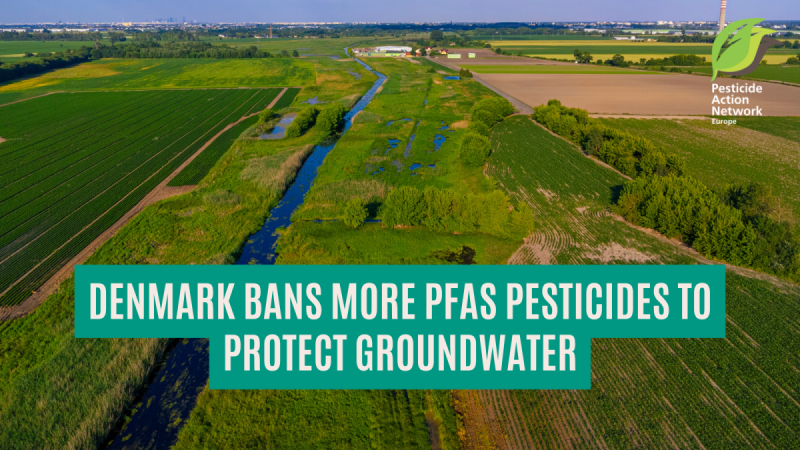The Danish Environmental Protection Agency has withdrawn the approval of 8 more pesticides that contain PFAS active substances. They can form and leach TFA into the groundwater. Pesticides approved for use in Denmark must not pose a risk to groundwater. In June, they already banned 25 other products. PFAS pesticides that have not yet been directly linked to TFA are still allowed in Denmark. The Danish Nature Conservation Organisation applauds the decision but calls for a swift ban of the other PFAS pesticides, especially the very harmful insecticide lambda-cyhalothrin.
The pesticide products that are now banned contain one of six active substances that can form TFA (trifluoroacetic acid). TFA leaks into groundwater, is toxic to reproduction and does not decompose. In 2025, the Danish Environmental Protection Agency has reassessed six PFAS active substances used in 33 pesticide formulations. This research project, “TriFluPest”, was initiated by the Danish Environmental Protection Agency and carried out by the National Geological Surveys for Denmark & Greenland (GEUS). They included other professional knowledge from ongoing EU assessments. The six PFAS pesticide active substances examined are: fluazinam, fluopyram, diflufenican, mefentrifluconazole, tau fluvalinat, and flonicamide.
In recent years, TFA was found in groundwater. Source tracing has shown a significant contribution from a number of industrial applications, such as refrigerants and propellants in spray cans. They contribute to TFA being found in rainwater. PFAS pesticides have also been shown to be a source of TFA. The EU’s risk assessments for pesticides did not previously include information about TFA. The research project from GEUS, compared with new assessments from the EU, has now shown that TFA is formed from the above active substances and leached into groundwater.
The eight pesticides containing one of the active substances mentioned above are prohibited in 3 months, 11 months and 14 months, respectively. The Danish Environmental Protection Agency has primarily placed emphasis on protecting the environment and groundwater, but at the same time looked at the social and economic consequences of a ban can have. If alternatives are available, the products are being phased out relatively quickly. In cases where alternatives are lacking and the social or economic consequences may therefore be significant, longer deadlines have been given.
A victory for the environment and drinking water
The Danish Society for Nature Conservation – member of the PAN Europe network – applauds the decision. "It is a great day for drinking water and the environment, and something we have shouted about should happen for many many years," says Maria Reumert Gjerding, president of the organisation. However, they criticise the slow pace. "We know that many of these PFAS pesticides end up in the groundwater as the Eternity Chemical TFA. And so of course, agriculture cannot still be allowed to use pesticides for a period of time, which we know for sure ends up in groundwater. Therefore, it is also head-shaking that you do not impose an immediate ban, but to allow potato and plant producers to contaminated with these substances in 2026."
The most dangerous PFAS poison is still legal
Although the phasing-out of the PFAS poisons now includes the bulk of the PFAS pesticides, a number of PFAS pesticides is not covered by the regulation. Their active substances have not yet been definitively studied for TFA leaching.
This applies, among other things, to pesticides containing the PFAS active substance lambda-cyhalothrin, part of our list of toxic 12 pesticides that should have been banned long ago. The Danish Nature Conservation Organisation brands it as one of the most environmentally harmful poisons that agriculture can use. It is used, among other things, to fight insects in winter rape and cornfields and in Christmas tree production.
"We are very concerned that the government has not chosen to include the super-poison lambda cyhalothrin in the planned phase-out. This pesticide is super harmful to the aquatic environment, and the fear, of course, is that the consumption here will increase as the other pesticides are phased out. Here, on the basis of a precautionary principle, the government should impose a ban," says Maria Reumert Gjerding.
In addition to the danger to the environment, this pesticide is also highly toxic to humans. It is neurotoxic, and bystanders are advised to keep a 10-meter distance from spraying. Independent studies suggest interactions of lambda-cyhalothrin with receptors of the endocrine and immune systems.
Read more:
